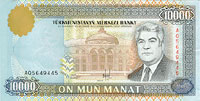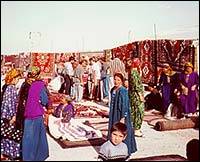Image: Ted Rall
ASHGABAT, Turkmenistan — It’s amazing what you can get away with in places where nobody is paying attention. In sparsely-populated Turkmenistan, a nation with the dubious honor of having the hottest desert on the planet, one man dominates the landscape: President-for-Life Saparmurad Niyazov, a.k.a. Turkmenbashi, “Head of All Turkmen,” as he had his rubber-stamp parliament declare him a few years back.
Formerly the Communist Party boss of the Turkmen Soviet Socialist Republic, Niyazov is a quirky autocrat who has built up the world’s most pervasive personality cult since Mao’s Cultural Revolution. The portrait of this 60-something, weirdly anti-charismatic leader (the guy looks like a bank president wearing an off-the-rack suit) is everywhere in this bleak, sandy nation. Public buildings, banks, and hotels all feature huge banners of his smiling face — lit up even on the all-too-frequent nights when the power goes out — next to his ubiquitous Nazi-inspired slogan, “Halk, Watan, Turkmenbashi” (Nation, People, Leader). Even in the middle of the vast Kyzylkym Desert, travelers on the Trans-Caspian Railway catch a glimpse of statues of Turkmenbashi resplendent in bronze sartorial tackiness.

|
Turkmenbashi renamed a Caspian Sea port city after himself, as well as a large meteorite that smashed into the northern part of the country. The excesses of his “pink pleasure palace” on the outskirts of Ashgabat pale only in comparison with the latest outrage: A 120-foot-high gold-plated statue of … guess who? It actually rotates to follow the sun. (The joke in Ashgabat is that it’s really the other way around.) It’s all terribly droll until one considers the country’s average salary is the equivalent of $20 per month in the US.
Niyazov keeps his plump, empty-eyed head off a stake with a cleverly alternating mix of totalitarian ruthlessness and generosity. Having jailed his few political opponents in 1993 just for being who they were, he issued a blanket political amnesty earlier this year after a bout with kidney disease made him reconsider his legacy. He maintains good relations with the CIA, whose closely-shorn agents you’ll find cold-chillin’ at the Florida casino/English pub/hamburger joint across the street from the Sheraton after a hard day at the US Embassy (a surreal patch of carefully-groomed Kentucky bluegrass nursed with Home Depot sprinklers, the only such vegetation for hundreds of miles).
The Turkmen borders with both Iran and Taliban-held Afghanistan are open and humming, and so far Turkmenbashi has managed to stay out of the way of the ever-present border disputes between Uzbekistan, Kyrgyzstan, Kazakhstan, and Tajikistan. And just to keep things interesting, he recently abolished the death penalty, calling it unworthy of a civilized society.
Turkmenistan has an insignificant amount of oil but huge potential reserves of natural gas. The trouble is that natural gas is cheap — so cheap, in fact, that it’s not worth extracting until prices go up someday. That could take a long time; Mexico’s been waiting for a gas boom since the Carter Administration.
What Turkmenistan does enjoy is the enviable ability to play the Russians against the Americans in negotiations for a pipeline. Washington wants to stop a pipeline that would transfer Iranian crude across what used to be called Transoxiana, under the Caspian and out through … who knows, details to be worked out later. (Many here firmly believe that the Soviet Union collapsed as a result of an American plot to secure oil rights for itself in the region.)
The Russians, meanwhile, want to re-Russify Central Asia through a pipeline from Russia-aligned Kazakhstan through Turkmenistan, and eventually through Afghanistan, if the Taliban and its Northern Alliance opponents ever stop killing each other long enough to sign up to be exploited. As with the natural gas, it’s hard to imagine how or when a pipeline could ever be built, though perhaps that’s Niyazov’s genius.

|
Like Azerbaijan, Turkmenistan enjoys no real chance at turning itself into a Gulf state of the sort where polygamous sheiks are forced to pay illegal immigrants more to park their cars than first-year corporate lawyers earn in New York. But the Turkmen, culturally nomadic and deeply distrustful of city life, expect little or nothing at all from their leaders other than rapacious greed and insolent indifference.
Someday the camel drivers and taxi drivers and petty businessmen may all rise up and consider the fact that they have nothing to lose but their chains, but in the interim they drown in plastic-bottled vodka and revel in the bizarre spectacle of the two state television stations that are both devoted to All Turkmenbashi, All the Time.















